Europe set for a fundamental clash of ideas
- Published
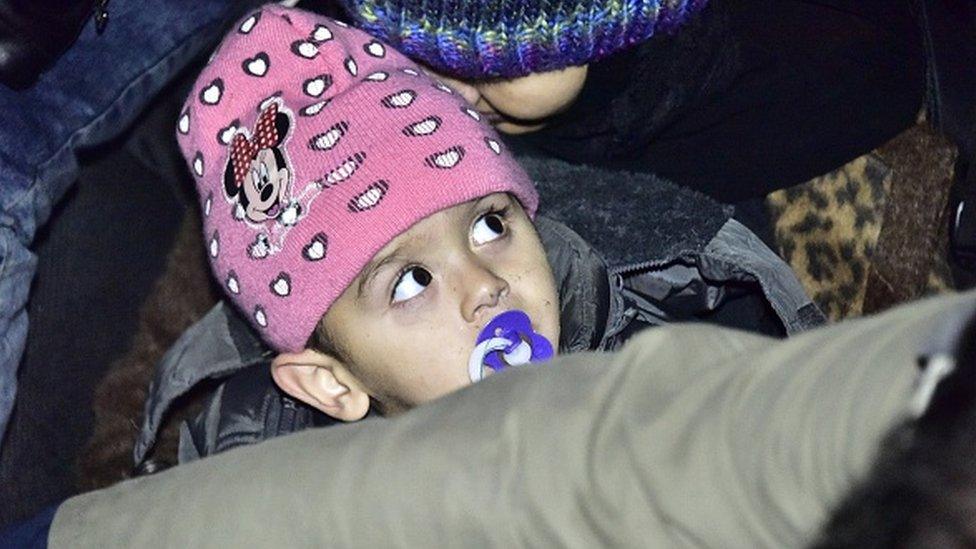
Turkey has been asked to limit numbers crossing into Europe
In Europe 2015 was, in part, the year of the unexpected: migrants, Schengen in doubt, terror, Volkswagen.
And yet much played out as predicted: a fresh Greek drama, a fragile economy and the continued rise of anti-establishment parties.
It was the year when crises came in waves pounding the shoreline and prompting leaders and officials to fret over the future of the European project.
In 2016 the migrant crisis will once again shape debate. It may subside during the winter months but it will return in the spring. The world knows that Germany has taken in over a million refugees. Its generosity will be tested further.
Angela Merkel's political future is bound up in the numbers of migrants that will arrive in 2016.
She may have won a standing ovation from her party at its annual conference in December but across Germany the doubts are growing.
The first test will come in state elections in the spring. If the conservative CDU polls badly then the questions will resurface about whether Angela Merkel can stand again in 2017.
There is no obvious successor but the test for the chancellor is a simple one. Is she right to insist that a limit cannot be imposed on the numbers arriving or will it put the social fabric under increasing strain?
Her future - and to a certain extent that of the European project - has been placed in the hands of President Erdogan of Turkey.
In 2016 he will decide whether Turkey's borders should be vigorously patrolled to limit the numbers crossing into Europe.
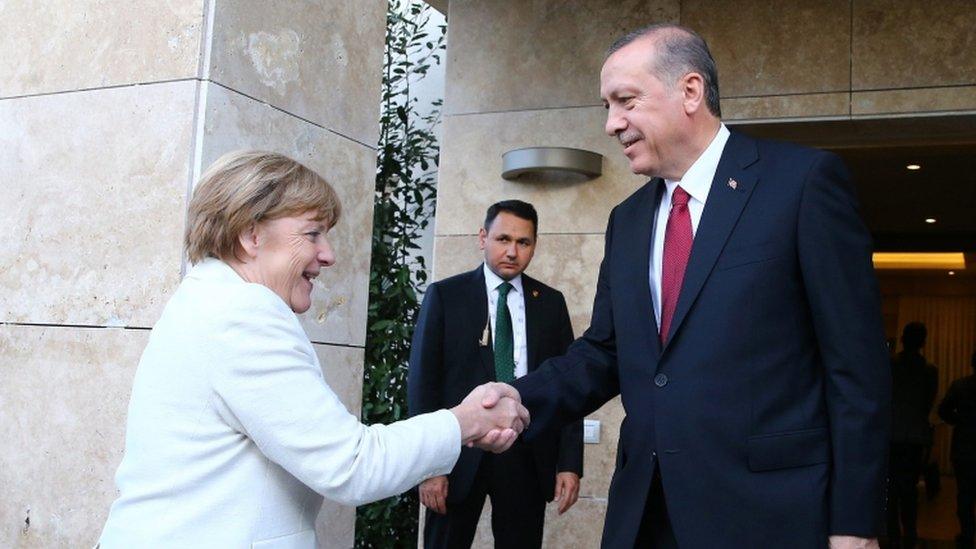
Chancellor Merkel and President Erdogan will be key figures in Europe next year
The Turkish president has been given every incentive to do so, including the offer of visa-free travel in Europe, but it remains uncertain what Turkey will do. The first indication will come when the weather improves.
Testing values
The year will also test Europe's determination to live up to its values. Will it stand up for press freedom in Turkey, or will necessity silence its voice?
The migrant crisis will also determine the future of the passport-free Schengen area. In the short term I expect more border controls and fences until Europe finds a way to process the new arrivals and limit their numbers.
Europe's leaders have said repeatedly that it will be impossible to defend its passport-free area unless its external borders are secure.
Greece and Italy have been overwhelmed by the numbers of migrants. Many do not even register at the place they arrive in Europe but just head towards Germany or Sweden.
In 2016 Europe seems determined to deploy guards to its external borders, even if that is against the wishes of the member state concerned.
There will be a battle over this but I expect a version of the plan to survive.
Why? Because the survival of Schengen will be framed as a battle to defend the European project.
European border guards will be another giant leap forward for European integration and will once again prove Jean Monnet right when he said that Europe would be built on its crises.

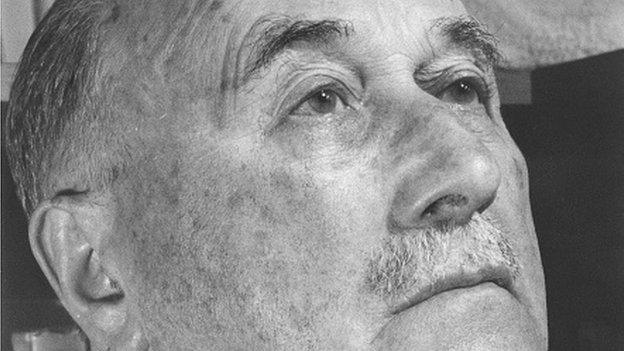
Jean Monnet said that Europe would be built on its crises
Jean Monnet:
French political economist and diplomat
Responsible for the successful plan to rebuild and modernise the French economy after World War Two
In May 1950 he and Robert Schuman, the French Foreign Minister, proposed a common European market for coal and steel for countries willing to delegate their powers over these industries to an independent authority
Six countries - France, West Germany, Italy, Belgium, the Netherlands and Luxembourg - signed the treaty in 1951 that set up the European Coal and Steel Community (ECSC)
From 1952 to 1955 Monnet served as the first president of the ECSC's High Authority. The ECSC inspired the creation in 1957 of the European Economic Community - the precursor to the European Union

Further attacks - like the ones in Paris - will deepen the debate about open borders.
UK referendum
The European establishment will be nervous about the UK referendum on its future in Europe.
The expectation is that David Cameron will hold an in-out referendum in the summer of 2016.
The view in Brussels is that a deal will be done in February enabling the prime minister to claim Britain's relationship with the EU has changed.
The polls suggest a tight campaign that will severely test the unity, external of the Conservative party.
If the polls predict a very close outcome then some of the banks expect there will be an impact on sterling, on the equity markets and on the inflows of capital that Britain depends on - running a current account deficit.
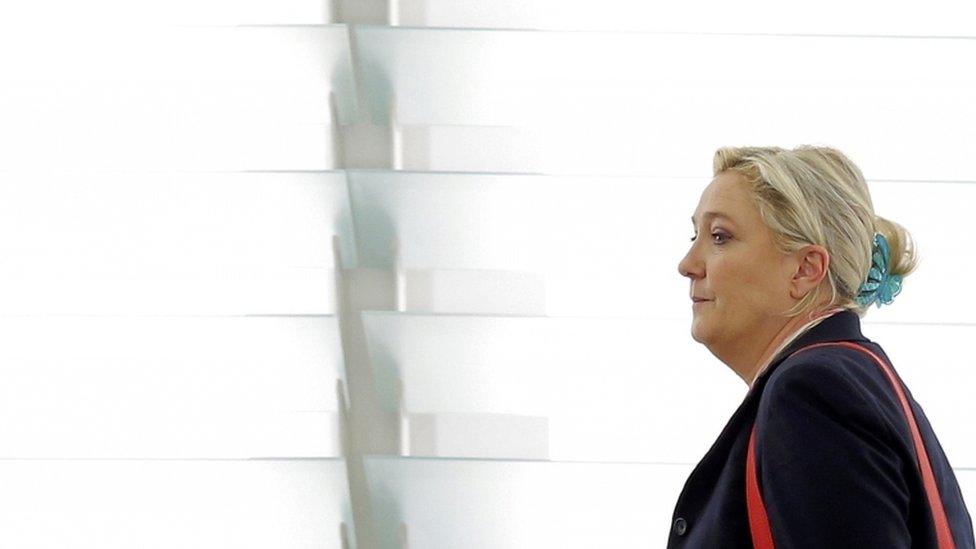
Marine Le Pen is making a concerted bid for power in France
In the end the campaign will come down to an argument over what life would be like outside the EU: reclaiming sovereignty and less regulation versus the uncertainty of what would happen to Britain's trading relationships, its economic security.
Several UK ministers believe that the vote will be decided by the issue of migration - a further indication of just how fundamental the migrant crisis is for the future of Europe.
The European economy has shown surprising resilience. The recovery has taken root but growth remains fragile. It is a recovery that remains vulnerable to shocks.
Germany - so reliant on its exports - survived the slowdown in emerging markets. This will be tested again in 2016 with the expected slackening in world growth.
Attention in Europe will fall on the French economy. Unemployment has edged up again. The year ahead will be dominated by the approaching presidential elections in 2017.
For the rest of Europe the key question is whether the Front National of Marine le Pen will be able to push beyond her current levels of support and become a real contender in 2017?
Challenges of austerity
Greece has been taken off the critical list but expect the Greek crisis to flicker back to life in the year ahead.
The radical left government in Athens is hoping that in 2016 debt relief will be on the agenda. Probably the most it can expect is that the terms of its debt repayments will be loosened.
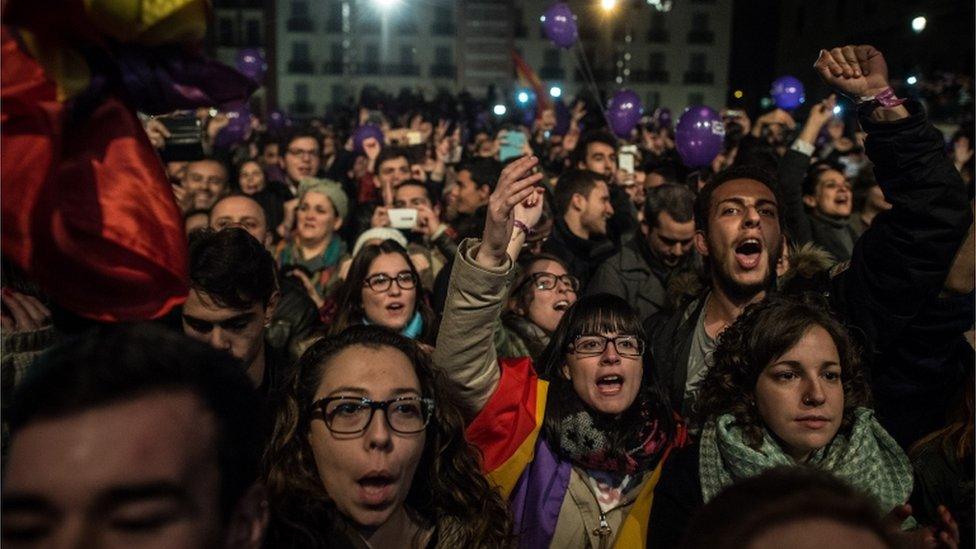
The anti-austerity party Podemos has growing support in Spain
The challenge for Greece and its creditors is that, at some stage, they will have to demonstrate where growth will come from and how unemployment will be reduced in order to sell pension reform and other tough measures.
2016 will see further slippage on countries meeting their deficit reduction targets.
Spain was set to miss its 2015 deficit target of 4.2% (it will stand at 4.7%) even before the recent election - which will usher in a period of political uncertainty. France will likely miss its deficit target through 2017.
With anti-austerity parties having done well in Spain and Portugal, external there will be fresh pressure on Brussels to police the deficit targets.
The big question for Europe's policymakers is whether it can escape so-called "secular stagnation" - a condition of negligible growth.
In 2016 watch sentiment incline further towards launching major investment projects.
World stage
In foreign affairs Europe will once again struggle to have an influential voice. Even though events in Syria are having a huge impact in Europe, Brussels is not a main player.
It will have a seat at the table at the expected Syrian peace conference but it won't have a card like the Russian president has dealt himself, external. Certainly members of the European Parliament will push for Europe to develop a convincing foreign policy.
After Syria, it is Libya that will preoccupy Europe's leaders. It is the most dangerous crisis.
Sooner or later Europe will have to address the question of whether they are prepared to allow the so-called Islamic State (IS) to have a base on the Mediterranean in Libya.
The current plan is to try to unite the various Libyan factions in the hope they can drive out IS.
If a terrorist attack in Europe was found to have its origins in Libya then the Italian government and its allies would come under huge pressure to respond.
2016 is likely to see Libya move up the international agenda.
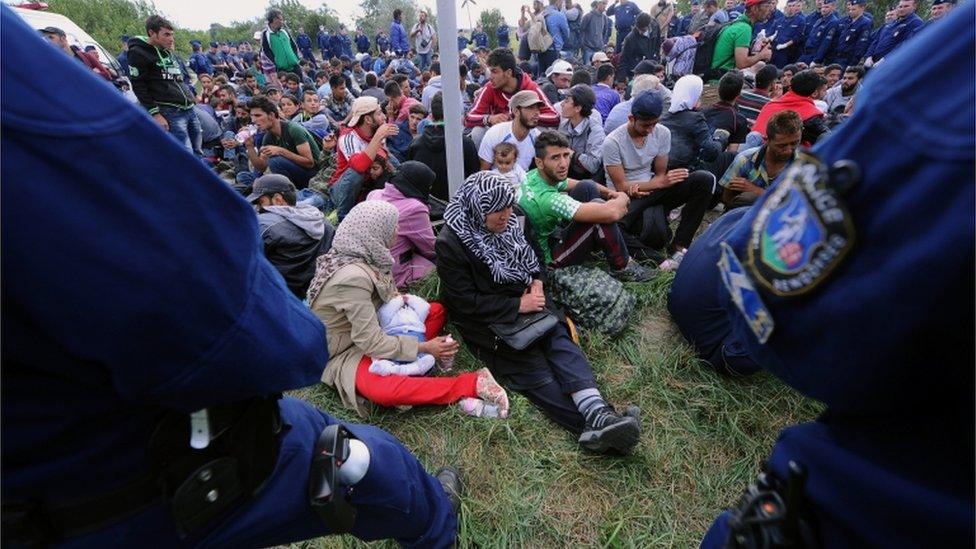
Hungary's prime minister has led a tough line in the country towards migrants
Over Ukraine, Europe will struggle to maintain the sanctions against Russia.
2016 will see a further clash of ideas: a struggle between nationalists and globalists; a struggle between those who want to revive the power of the nation states and those who believe the answers lie in international bodies like the EU; a struggle between those who believe they are defending Europe's Judeo-Christian traditions (like Hungarian Prime Minister Viktor Orban) and those wedded to multiculturalism (Angela Merkel).
2015 began with the attack on the offices of the Charlie Hebdo magazine in Paris. It was seen as an attack on freedom of speech and drew thousands on to the streets.
But the argument has not been resolved.
The clash is about the right to offend. In universities in North America and Europe protesters seek to limit debate.
But can you have freedom without the right to offend? Or should speech be curtailed in defence of the right to be different, to be a minority?
2016 will be the year of the migrant but it will be marked by a clash over ideas and freedoms.